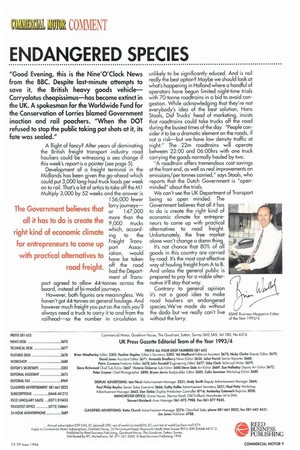ENDANGERED SPECIES
Page 11

If you've noticed an error in this article please click here to report it so we can fix it.
"Good Evening, this is the Nine'O'Clock News from the BBC. Despite last-minute attempts to save it, the British heavy goods vehicleCarryalotus cheapissimus—has become extinct in the UK. A spokesman for the Worldwide Fund for the Conservation of Lorries blamed Government inaction and rail poachers. "When the DOT refused to stop the public taking pot shots at it, its fate was sealed."
A flight of fancy? After years of dominating the British freight transport industry road hauliers could be witnessing a sea change if this week's report is a pointer (see page 5). Development of a freight terminal in the Midlands has been given the go-ahead which could put 3,000 long-haul truck loads per week on to rail. That's a lot of artics to take oft the M1 Multiply 3,000 by 52 weeks and the answer is 156,000 fewer lorry journeys— or 147,000 more than the 9,000 trucks which, according to the Freight Trans port Association, would have be taken off the road had the Department of Trans port agreed to allow 44-tonnes across the board, instead of bi-modal journeys. However, both figures are meaningless. We haven't got 44-tonnes on general haulage. And however much freight you put on the rails you'll always need a truck to carry it to and from the railhead—so the number in circulation is unlikely to be significantly educed. And is rail really the best option? Maybe we should look at what's happening in Holland where a handful of operators have begun limited night-time trials with 70-tonne roadtrains in a bid to avoid congestion. While acknowledging that they're not everybody's idea of the best solution, Hans Shoals, Daf Trucks' head of marketing, insists that roadtrains could take trucks off the road during the busiest times of the day. "People consider it to be a dramatic element on the roads, if not a risk—but we have low density traffic at night." The 22m roadtrains will operate between 22:00 and 06:00hrs with one truck carrying the goods normally hauled by two, "A roadtrain offers tremendous cost-savings at the front end, as well as real improvements on emissions/per tonnes carried," says Stools, who reports that the Dutch Government is "openminded" about the trials.
We can't see the UK Department of Transport being so open minded. The Government believes that all it has to do is create the right kind of economic climate for entrepreneurs to come up with practical alternatives to road freight. Unfortunately, the free market alone won't change a damn thing. It's not chance that 80% of all goods in this country are carried by road. It's the most cost-effective way of hauling freight from A to B. And unless the general public is prepared to pay for a viable alternative it'll stay that way. Contrary to general opinion it's not a good idea to make road hauliers an endangered species.We've made do without the dodo but we really can't live without the lorry.
















































































































